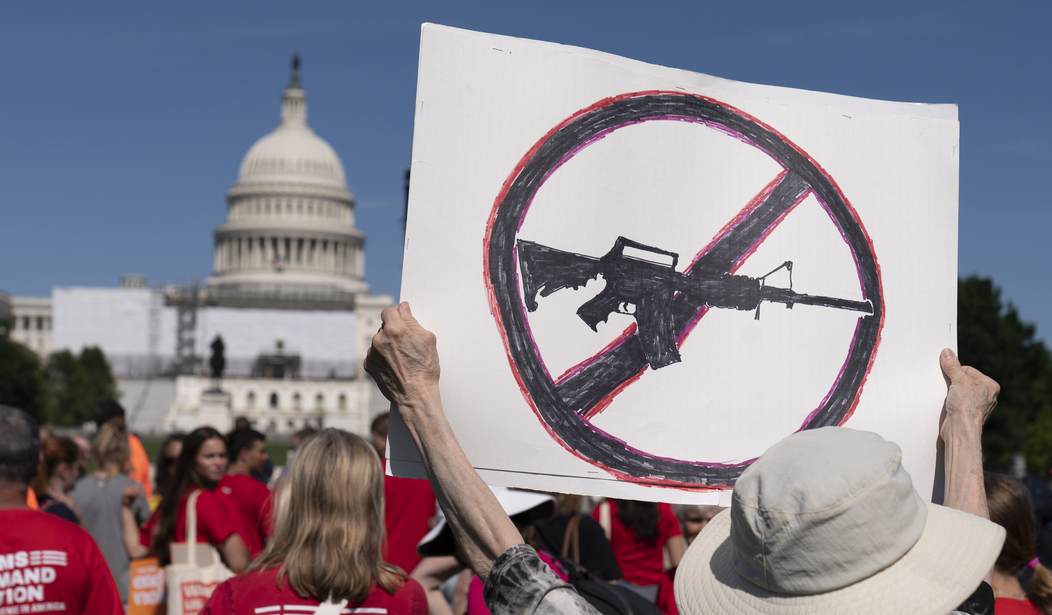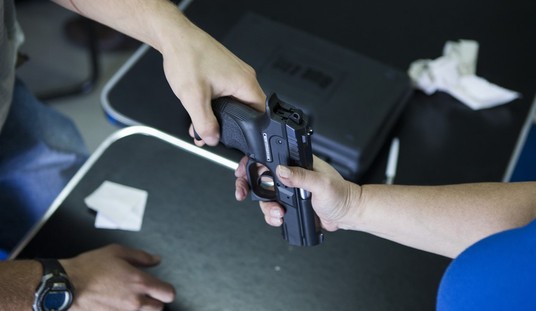The bipartisan agreement announced by Chris Murphy and John Cornyn on Sunday is going to empower and invigorate anti-gun activists and gun-banning politicians, but it’s not going to satiate their appetite for taking a much bigger bite out of our right to keep and bear arms going forward.
Over at Townhall, my friend and colleague Julio Rosas says that New Jersey Gov. Phil Murphy gave the game away on Sunday when he said in response to the news that a deal had been brokered, “[t]he door has cracked open. We must open it wider,” but Murphy’s comments shouldn’t come as a surprise to anyone who closely follows this issue. The anti-gun governor has never met a gun control law he found “unreasonable” or lacking in “commonsense,” and doesn’t see the Constitution or the Bill of Rights as any impediment to his prohibitionist agenda.
He’s not alone. While most gun control activists are supportive of the agreement announced yesterday, it’s because they view a Senate deal as a “starting point“, not an end game.
“On the day after youth across the country took to the streets to demand change, including right here in Boston, it is heartening to see federal action on preventing gun violence,” said Ruth Zakarin of the Massachusetts Coalition to Prevent Gun Violence.“The Senate framework does not include key measures such as universal background checks or a ban on semiautomatic weapons, but it does have important provisions, including closing the ‘boyfriend loophole’ and expanded resources for implementing Extreme Risk Protection Orders,” she added. “While we are glad to see the announcement of the Senate agreement, we hope to soon see federal action that mirrors the Massachusetts package of gun safety measures, a model that we know works and saves lives.”… A lead organizer of the March For Our Lives Boston rally said the Senate package is a “good starting point.” But Jaylin Gemmel added that some parts of the deal are “missing the mark.”“While funding for mental health services is important, mental health must not be scapegoated for mass shootings in the process,” Gemmel said. “We also are thankful for the closure of the boyfriend loophole. However, the proposal does not go far enough to raise the age of gun purchasing or make background checks universal.”
A solid majority of Democrats, 58 percent, named the issue as a top concern, up from 33 percent in early May, while 41 percent of independents said the same, up from 19 percent. Republicans also became more worried about crime and/or gun violence, but the uptick was much smaller, going from 19 percent in May to 29 percent now.
We also found a sizable jump in the share of Black and Hispanic Americans who named crime and/or gun violence as one of the biggest issues for the country, which helps explain, in part, the higher degree of concern among Democrats, as Democrats are more racially and ethnically diverse than Republicans. The share of Hispanic Americans who cited the issue more than doubled, growing from 23 percent in May to 61 percent. To a lesser but still significant extent, the share of Black Americans who named gun violence or crime as a top issue also jumped, going from 35 percent in early May to 55 percent in our latest survey. White Americans were also more likely to be worried, but their overall level of concern was comparably lower: Thirty-five percent named the issue as a top worry, up from 19 percent a month ago.
If the deal struck on Sunday manages to get to Biden’s desk for his signature, the Republicans who voted for it can rightfully say they did “something” to address violent crime while still attacking Democrats for wanting to go much further. Democrats, meanwhile, can rightfully boast that they managed to get new gun control provisions approved by Congress while still attacking Republicans for not going far enough.
From a political perspective, then, both sides are getting something out of this, though I think Democrats are getting more. Not only do they get to claim their first gun control victory in Congress in 30 years (a fact that they’ll be trumpeting to no end between now and November), they get to keep beating up Republicans for not embracing their demands to ban so-called assault weapons and “large capacity” magazines; impose waiting limits on all gun purchases; create new gun licensing, registration, and storage mandates (complete with federal prison time for non-compliance) for legal gun owners; and a host of other new criminal offenses carved out of our right to keep and bear arms.
I doubt, however, that’s going to be enough to prevent a red wave election this fall, and if Republicans take back one or both chambers of Congress the Democrats’ anti-gun demands are likely to be put on the back burner next year. Still, the gun control lobby knows how to play the long game, and as Murphy said, now that the door has been cracked, he and other anti-gun politicians are going to do their best to kick it open wide.









